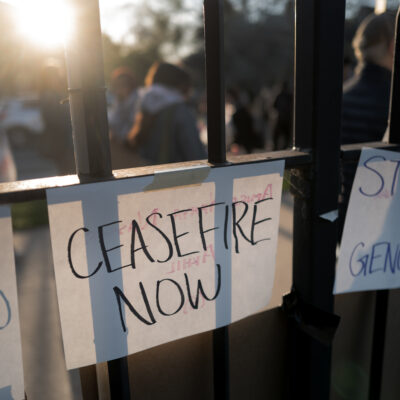Mixed reactions on Capitol Hill to U.S.-Iran hostage swap
Some key Democrats expressed concerns about parts of the deal

CRAIG RUTTLE/POOL/AFP via Getty Images
Secretary of State Tony Blinken speaks during a news conference as he announces that five Americans who had been jailed for years in Iran have been freed, in New York City on September 18, 2023.
The completion of the Biden administration’s deal to free U.S. hostages from Iran in exchange for Iranian prisoners held in the U.S. and the unfreezing of $6 billion in Iranian funds held in a South Korean bank was met on Monday with mixed reactions from Capitol Hill, including from some key Democrats.
Rep. Dean Phillips (D-MN), the top Democrat on the House Foreign Affairs Committee’s Middle East subcommittee, expressed initial concerns about the agreement.
“Iran is a clear and present danger, and the prisoner swap deal is disconcerting on the surface,” Phillips said. “That said, it’s irresponsible to draw conclusions until the administration shares more information. I’m hopeful there’s more than meets the eye, and will opine once that’s clear.”
Sen. Bob Menendez (D-NJ), the chair of the Senate Foreign Relations Committee, reiterated past statements celebrating the release of hostages, while raising broader concerns about Iran’s behavior.
“The joy of seeing [the released hostages] safely home is embittered by the knowledge that others, like Shahab Dalili and Jimmy Sharmahd, remain unjustly imprisoned in Iran, as do many citizens of our allies and partners,” Menendez said in a statement, in which he also raised concerns about Iran’s continued lack of transparency regarding Robert Levinson, a U.S. citizen who is believed to have died in Iranian custody.
Menendez reiterated his view that “the United States cannot permit travel by U.S. citizens” to “hostile nations” including “Iran, Russia, North Korea, Venezuela, or the People’s Republic of China,” which he said have indiscriminately taken U.S. citizens hostage.
Sen. Joe Manchin (D-WV), who opposed the administration’s efforts to rejoin the Iran nuclear deal, did not respond to a question from Jewish Insider about the deal as he entered an elevator in the Senate on Monday.
Some Democrats, including those leery of talks with Iran, are supportive of the deal.
Sen. Ben Cardin (D-MD) indicated that he generally backed the agreement, echoing the administration’s position that the frozen funds belonged to Iran and would be subject to strict controls only allowing them to be spent on humanitarian causes.
Cardin said that we “have to make sure that’s the case” that the restrictions will be enforced, but added, “I’m pleased that we were able to get Americans home.”
Pressed on the possibility that the released funds could free up funding elsewhere in the Iranian government’s budget for malign activities, as critics of the agreement have warned, Cardin emphasized that humanitarian exceptions to sanctions are long-standing.
“That was the ground rules on which we set up these frozen accounts,” Cardin said. “We allowed these countries to continue to buy Iranian oil provided the resources only went for certain purposes. As I understand it, the bank that the money was in couldn’t accommodate that, it’s being transferred to a bank that can.”
The deal was met with criticism from Republicans.
Rep. Michael McCaul (R-TX), the chair of the House Foreign Affairs Committee, said in a statement that while he’s “immensely relieved” that the hostages will return home, he is “very concerned” that the deal will incentivize further hostage-taking, that it will be difficult to maintain safeguards on the $6 billion and that “there is no question this deal will free up funds for Iran’s malign activities.”
“U.S. citizens should not travel to Iran; the risks are far too great, and the potential consequences are catastrophic,” McCaul said. “We need swift, significant action to restore deterrence against Iran’s hostage-taking and other malign activities.”
Sen. Tom Cotton (R-AR) raised alarms about reports that some of the Iranian prisoners released from U.S. custody, including one who worked as an unregistered foreign agent for Iran, would remain in the United States.
“If the deal isn’t reversed, you should at minimum remove all Iranian agents from American soil,” Cotton said in a letter to Secretary of State Tony Blinken. Cotton demanded answers from Blinken about whether the released individuals could be deported and how the administration plans to monitor their activities and communications.









